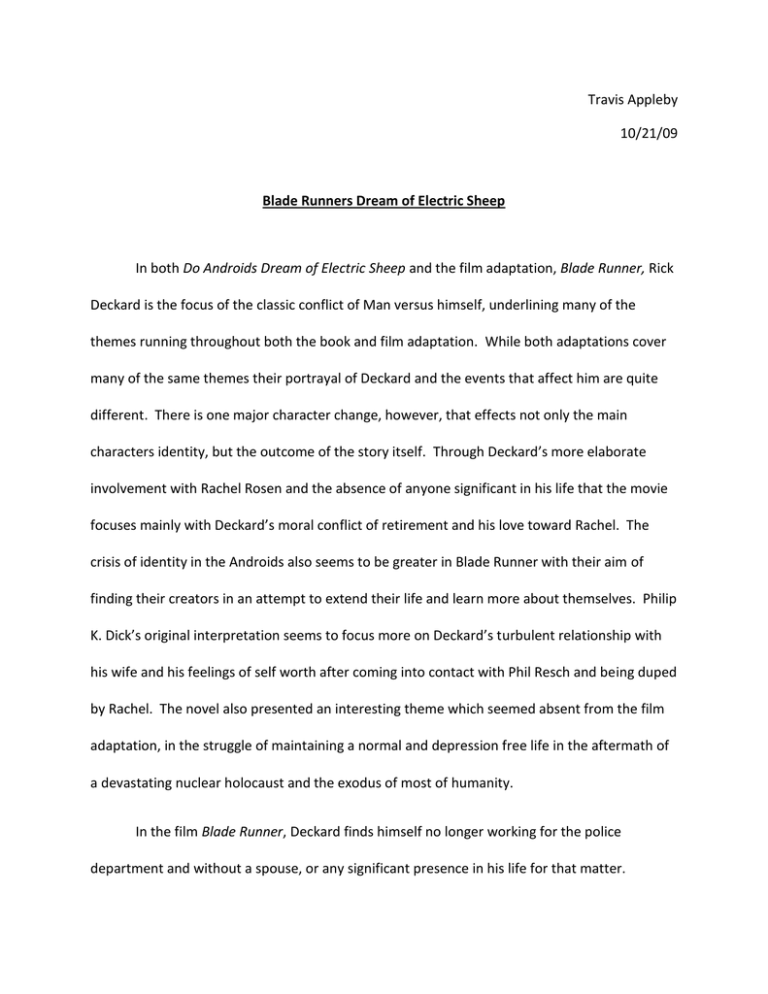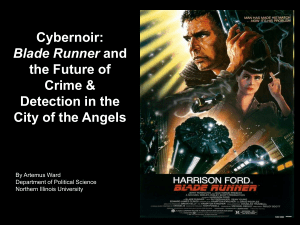Travis Appleby 10/21/09 Blade Runners Dream of Electric Sheep In
advertisement

Travis Appleby 10/21/09 Blade Runners Dream of Electric Sheep In both Do Androids Dream of Electric Sheep and the film adaptation, Blade Runner, Rick Deckard is the focus of the classic conflict of Man versus himself, underlining many of the themes running throughout both the book and film adaptation. While both adaptations cover many of the same themes their portrayal of Deckard and the events that affect him are quite different. There is one major character change, however, that effects not only the main characters identity, but the outcome of the story itself. Through Deckard’s more elaborate involvement with Rachel Rosen and the absence of anyone significant in his life that the movie focuses mainly with Deckard’s moral conflict of retirement and his love toward Rachel. The crisis of identity in the Androids also seems to be greater in Blade Runner with their aim of finding their creators in an attempt to extend their life and learn more about themselves. Philip K. Dick’s original interpretation seems to focus more on Deckard’s turbulent relationship with his wife and his feelings of self worth after coming into contact with Phil Resch and being duped by Rachel. The novel also presented an interesting theme which seemed absent from the film adaptation, in the struggle of maintaining a normal and depression free life in the aftermath of a devastating nuclear holocaust and the exodus of most of humanity. In the film Blade Runner, Deckard finds himself no longer working for the police department and without a spouse, or any significant presence in his life for that matter. Without many relationships to help foster Deckard’s connection to his own race this leaves him more vulnerable to the ethical conflict he encounters throughout his career. Deckard does not seem entirely overwhelmed by his conscience until his life is saved by Rachel Rosen and he’s able to get closer to her. In many ways her struggle with her own identity helps Deckard empathize with her, as she is seen not as some diabolical machine gone haywire but a young, sentient being struggling to come to terms with herself as evidenced in the script “Tyrell really did a job on Rachael. Right down to a snapshot of a mother she never had, a daughter she never was. Replicants weren't supposed to have feelings. Neither were Blade Runners. What the hell was happening to me? Leon's pictures had to be as phony as Rachael's. I didn't know why a replicant would collect photos. Maybe they were like Rachael. They needed memories.”. Rachel’s ability to actually fall in love sets her apart from her counterpart in Phillip K. Dick’s novel. She is portrayed as more of a free-thinking and emotional individual as opposed to a convincing simulation. The Rick Deckard we see portrayed in Do Androids Dream of Electric Sheep is someone not entirely isolated, but connected to an ailing humanity through a number of personal relationships he is able to foster throughout the novel. This incarnation of Deckard is also driven by a great sense of pride, mainly in the type of pet he can own as a symbol of his personal wealth. Deckard constantly struggles with his self-worth throughout the novel as evidenced in this passage right after Deckard purchases a new animal: “The expense, the contractual indebtedness, appalled him; he found himself shaking. But I had to do it, he said to himself. The experience with Phil Resch – I have to get my confidence, my faith in myself and my abilities, back. Or I won’t keep my job”. Even despite Deckard’s own conflicts with his self- worth and his line of work, he shares the difficulties of the rest of humanity as they struggle to cope with a post-apocalyptic nuclear waste-land. The survivors of World War Terminus, Deckard included, are faced with an overpowering sense of isolation and depression. This is mainly expressed by Deckard’s wife early on in the book: “’…I shut off the sound. And I heard the building, this building; I heard the –‘she gestured. ‘The Empty Apartments’ Rick said. Sometimes he heard them at night when he was supposed to be asleep”. So overpowering is this depression that Deckard and his wife use mood-controlling devices to manage their emotions and allow them to get through the day. Perhaps the most important difference between Philip K. Dick’s novel and the film adaptation is the portrayal of Rachel Rosen and her affect on Deckard. Rachel clearly has the most influence on Deckard and his actions. The differing outcomes of both the novel and film adaptation are directly dependant on the different portrayals of Rachel Rosen. In the novel it is Rachel’s betrayal of Deckard that drives him to complete his assignment and continue his work to become the area’s most prominent bounty hunter, whereas in the film adaptation Rachel’s devotion and love are what convince Deckard to quit his job and run away with her. Rachel’s struggle with her own identity, as illustrated here is part of what allows her to fall in love “’ You remember the spider that lived in a bush outside your window? Orange body, green legs. Watched her build a web all summer. Then one day there was a big egg in it. The egg hatched…’ ‘And a hundred baby spiders came out. And they ate her.’ ‘Implants! Those aren't your memories. They're somebody else's. They're Tyrell's nieces’’. The Rachel in the novelization is certain in her sense of identity and is actively seeking to dupe and betray Deckard for the benefit of the Rosen Association. Rachel’s ability to manipulate Deckard through numerous fake identities is referenced in Sherry Turkle’s article on Cyberspace and Identity: “In thinking about the self, multiplicity is a term that carries with it several centuries of negative assosciations, but such authors as Kenneth Gergen (1991), Emily Martin (1994), and Robert Jay Lifton (1993) speak in positive terms of an adaptive “flexible self”. The flexible self is not unitary, nor are its parts stable entities. A person cycles through its aspects, and these are themselves ever-changing and in constant communication with each other”. The Rachel in the film adaptation, however, fulfills an entirely role as well as a different identity. In great contrast to the Rachel Rosen of the novel, the Rachel in the film is not certain of her identity in the least and in fact struggles throughout most of the film to come to terms with the fact that she is an android and it is this struggle with identity that attracts Deckard to her as he can empathize with her in relation to his own situation. Deckard’s feelings for Rachel are referenced numerous times throughout the script of the film: “The report would be routine retirement of a replicant which didn't make me feel any better about shooting a woman in the back. There it was again. Feeling, in myself. For her, for Rachael”, and ultimately Deckard is overcome by his love for Rachel and is able to see past the fact that replicants are artificial and value them, especially Rachel, for their value as living beings. There are many differences between Philip K. Dick’s novel and its film adaptation, ranging from the subtle to the extreme. Each adaptation clearly focuses on different conflicts within Rick Deckard, with each shaping him differently and leading to a different outcome in both the novel and the movie. While the film adaptation seems to focus more on Deckard’s moral conflictions with his line of work and his love for the replicant, Rachel Rosen, Philip K. Dick’s original novel focused more on Deckard’s turbulent relationship with his wife and his constant questioning of his self-worth. Having little to no relations with anyone other than himself leaves Deckard vulnerable to the change Rachel brings about in him in the film adaptation, while in Philip K. Dick’s novelization Deckard is strongly tied to numerous individuals, namely his wife and neighbor, leading him to constantly question both his worth and ability while constantly comparing himself to those around him. It is clear the most definitive difference between the film and novel is the portrayal of Rachel Rosen and her affect on Rick Deckard, by changing one of the most important characters in the book the film dramatically altered the ending as well as the main character’s progression throughout the film. Despite their differences, each incarnation of the story provides an unforgettable experience while raising more than a few questions on our identity and the potential value in artificial life. Works Cited Turkle, Sherry. "Cyberspace and Identity." Writing and Reading Across the Curriculum: Brief Edition. Ed. Laurence Behrens and Leonard J. Rosen. New York: PearsonLongman, 2004. 123-132. Print. Blade Runner. Dir. Ridley Scott. Perf. Harrison Ford, Rutger Haur, Sean Young, Daryl Hannah. Warner Brothers, 1982. Film. Dick, Philip K. Do Androids Dream of Electric Sheep? 1968. Introduction Roger Zelazny. New York: Random House-Del Rey, 1975. Print.


